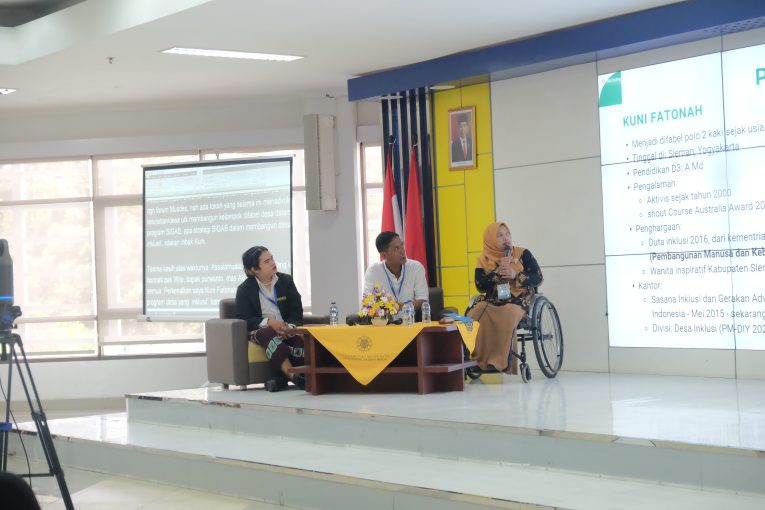
Yogyakarta, November 22nd 2023─The agenda for implementing inclusivity is designed by involving all elements, from the community to the government. The village as the unit closest to the community occupies a crucial position to build this joint commitment. Unfortunately, the village culture, which is mostly built on conservative culture, is still unable to accept the existence of people with disabilities. Negative stigma, unaccommodated limitations, and violence are still problems that make disabled people discriminated against.
Through the International Conference on Disability Rights (ICDR) discussion, panel 1A raised the issue of inclusive village development. Several resource persons were presented to explain the conditions of disabled groups in rural areas and what efforts have been made. One of the programs being promoted is Strengthening Social Inclusion for Disability Equity and Rights (SOLIDER). This program was initiated by Kuni Fatonah, an activist who has also pioneered the Sarana Iklusi dan Gerakan Disabilitas (SIGAB). The forum is also committed to building inclusivity starting at the village level.
“This village or government is a model of government that accommodates the rights of all people, including people with disabilities. So in an inclusive village, there must be a village or kelurahan government that involves active community participation, is open, respectful, and removes barriers,” said Kuni. To build an inclusive village, there are nine indicators that have been formulated by SIGAB. All of these indicators specifically include aspects of accessibility, data collection of disabled groups, policy participation, and community acceptance.
People in villages generally still adhere to the values and traditions passed down from generation to generation that shape the social character of the individuals. This is recognized to greatly affect the level of community acceptance of people with disabilities. According to Kuni, inclusive villages are a manifestation of community cooperation and collaboration to create an environment that embraces every element of society. Not only Kuni, the UGM alumni group also pursues several researches in rural areas that do not have a basic foundation in fulfilling disability rights.
“We found that because some villagers live below the poverty line, they value mutual cooperation. So anyone who cannot actively participate in cooperation, usually gets different treatment. Moreover, people in rural areas are closed, so it is difficult to accept new concepts that are different from their culture,” said Akhyar Rafi’i. The research conducted by Akhyar and his team was located in Kurau District, Tanah Laut Province, South Kalimantan. It was found that the disabled group from the village received stigmatization oriented towards their limited abilities.
“Rural areas are conservative areas that have very complicated problems. Equality can only be achieved if all elements of society accept the existence of vulnerable and marginalized groups. This research proves that community participation is still lacking. And this is what we must encourage to create a sustainable inclusive environment,” Akhyar said.
